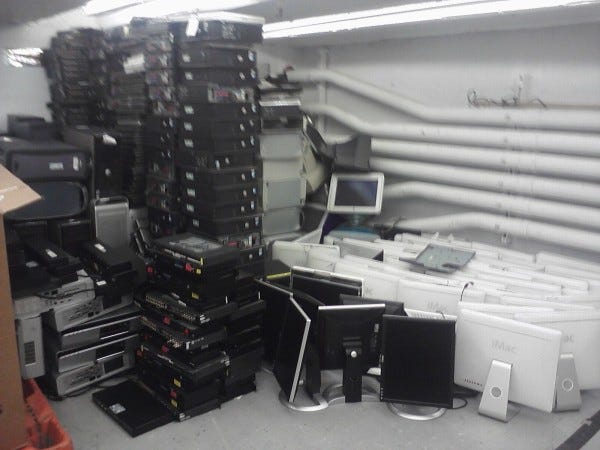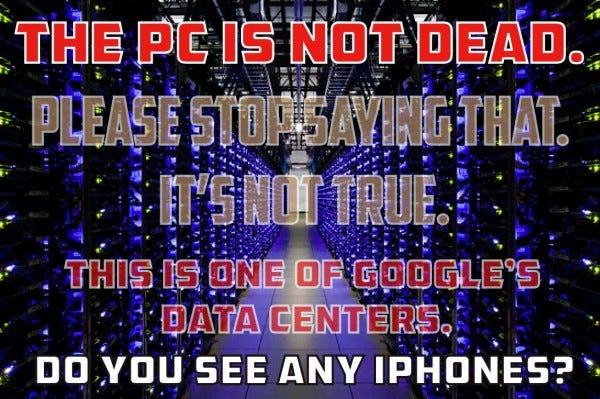An Ode to PCs? Not Likely
Click to read the full story: An Ode to PCs? Not Likely

The end is nigh, says the generic, religious homeless person with a sandwich board. PCs are out! Convert to mobile! Let us go to the cloud! Are PCs doomed to death soon? Should he be believed? There are tons of articles on the internet that suggest that personal computers, PCs are on their way out. That PCs will be gone in the next ten years or so, as we move to the cloud and turn mobile devices instead. PCs are losing the popularity they had, compared to how it was during the massive technological boom of the 90s and early 2000s and the advent of the internet. But PCs have hardly worn out their welcome. Notions that PCs will be gone very soon are nothing short of delusional. What could be gone is the PC as we know it but not the PC itself.
The prevalence of smaller devices like PDAs, smartphones, tablets and Phablets could lead many to suggest that the PC is on its way out. Casual users, if they owned a desktop or laptop these days, would use their computers mostly to browse the internet, read the news, to play games, send email and to catch up on social media. The emergence of smartphones and tablets changed all that, perfect for such uses and they’re much more portable to boot. Apart from the fact that PC sales have been slumping ever since these smaller computers, especially tablets, started hitting the market.
The term, personal computer, taken literally, means a small computer meant to be used personally or can be used by a person at any time for whatever means. In the olden days, these computers include the Apple II, the Commodore 64, the Vic 20, the Amiga, not just the IBM Personal Computer. When IBM did release the PC with the Intel 8088 processor along with Microsoft’s PC-DOS, the definition for the PC acronym changed. The term PC meant the old IBM PC and any other computer compatible with it. Later on, the term PC has come to mean any computer which uses the Intel x86 processor architecture or any compatible processor that runs Windows as an operating system. These computers are still as personal in the office as they are at home, used by one person at a time. These days, if the term personal computer is again taken literally, PDAs, smartphones, tablets and phablets fall into that category. So instead of being gone, the personal computer actually became much more personal.

But if we were to follow the line of thinking of many personal computer pundits who refer to the Intel/Windows or Wintel architecture, market share has indeed significantly fallen as more and more people choose mobile devices over heavier laptops and chunky desktops. Which is quite true. The PC would be dead only for these people who have no need of a Wintel desktop or laptop just to be online to watch cat videos or suffer Facebook envy. Any Android or iOS powered mobile device, a Wi-Fi router and a broadband connection would suffice for surfing and communicating on the internet.
What PC doomsayers fail to account for are students and professionals who need real computers for study and do creative work. Not everything can be done on a mobile device such as a tablet. Desktop publishing, graphics editing, video editing, long documents such as books and contracts, spreadsheets, databases and app development require more power, a bigger screen, a mouse and a large physical keyboard preferably with a dedicated numerical keypad. These applications are difficult if not impossible to do on small screens with digital keyboards that take up screen real-estate when summoned to type something; so whoever says that the PC will be dead very soon is in a state of delusion. Students need a laptop or a desktop to effectively type a long report, thesis or term paper. Office workers need either a laptop or a desktop to work on their own reports, spreadsheets and to enter invoices, receipts and payroll to the company database. In fact, mobile devices are very much dependent on PCs for their apps to be created since developers need plenty of computing power to create them.
When it comes to the Wintel/PC synonym, a desktop or laptop by any other operating system is still a PC. Windows may have lost some market share due to the Windows Vista and Windows 8 fiascos which paved the way for Linux and Macs but Windows is still the leading operating system in the PC world. Many still hold onto their old Windows 7s and Windows XPs on their old work PCs waiting for the smoke to clear on Windows 8 and for Windows 10 to reveal itself. Sales may be down but PCs running Windows are still very much in use in small to large enterprises. Many, in the publishing and advertising industries are running Macs, which are popular for such applications. Security professionals, hobbyists and free software advocates and companies saving up on software choose to run various distros of Linux and open source software. Some students and others who are always online and think the cloud is the way to go choose Chromebooks. All these applications and operating systems run on Intel-based machines since the old Motorola-based Mac architecture has run its course. The mobile ARM architecture however is gradually gaining some traction and invading the desktop realm.
We do however need to say goodbye to the familiar large beige, gray and black boxes many of us have become familiar with, except maybe for desktop-based gamers. A good laptop, whatever the operating system can easily replace the desktop while desktop form factors have also become smaller. Low-cost, low-power, silent NUCs (New Unit of Computing) are slowly getting popular as well as hobbyist bare boards such as the Raspberry Pi have become a success. Boxless all-in-ones are great for managers, the MacPro looks like a blender and Alienware came up with something that looks like a starfish. Nothing can be more personal than these previous examples. Windows-powered tablets and hybrids carry on the PC tradition over to mobile and these are also gradually getting popular because they prove more useful than consumer tablets since they can natively run important Office apps. Desktop and laptop sales are expected to boom when Windows 10 comes out and if it proves to be much better than Windows 8, enterprises holding on to Windows XP are finally expected to move on.
The PC isn’t dead yet nor is it on life support. It’s gradually coming back because they have more purpose. It’s more like in a cocoon waiting to transform into something better.
The post An Ode to PCs? Not Likely appeared first on Movie TV Tech Geeks News By: Marius Manuella
